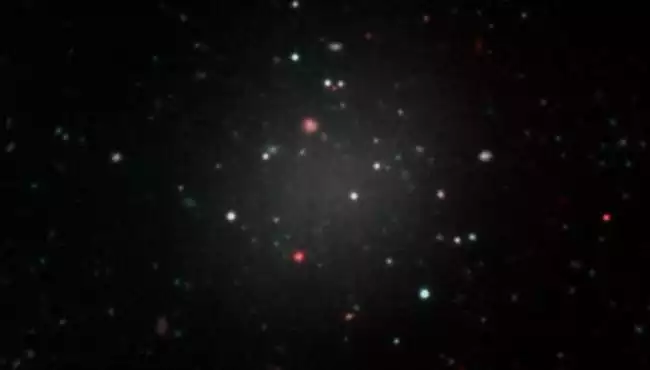The discovery is surprising and overturns conventional views on the nature and formation of galaxies.
The galaxy, called NGC1052-DF2, is about 65 million light-years away from Earth. Given its large size and faint appearance, researchers have classified it as an ultra-diffuse galaxy, which is a relatively new type. Such galaxies have almost the same size and mass as the Milky Way, but they lack brightness as they contain fewer stars. Over the years, researchers have discovered a number of very faint and diffuse galaxies, but no other galaxy of this type is found to be lacking dark matter.
"Finding a galaxy without dark matter is unexpected because this invisible, mysterious substance is the most dominant aspect of any galaxy," said lead author Pieter van Dokkum of Yale University. "For decades, we thought that galaxies start their lives as blobs of dark matter. After that everything else happens: gas falls into the dark matter halos, the gas turns into stars, they slowly build up, then you end up with galaxies like the Milky Way. NGC1052-DF2 challenges the standard ideas of how we think galaxies form."
The discovery was made possible by NASA/ESA’s Hubble Space Telescope. Further observations from other telescopes helped researchers to determine the size and brightness of the galaxy. Researchers have found that the size of NGC 1052-DF2 is equivalent to Milky Way, but it has roughly 250 times fewer stars. These stars are located in 10 globular clusters that orbit the galactic core and these globular clusters are moving much slower than expected. The slower the objects in a system move, the less mass there is in that system.
Researchers have calculated that all the mass in the galaxy is comparable to the mass of its stars, leading to the conclusion that NGC 1052-DF2 has no dark matter.
"If there is any dark matter at all, it's very little," van Dokkum explained. "The stars in the galaxy can account for all of the mass, and there doesn't seem to be any room for dark matter."
Galaxies are expected to have a dark matter that makes up most of the mass in the universe. Although we can’t directly observe it, its presence can be detected through gravity effects on visible objects.
In the latest study, researchers were able to assess the structure of the far-off galaxy, but they still do not explain how this galaxy formed.
"It's like you take a galaxy and you only have the stellar halo and globular clusters, and it somehow forgot to make everything else," said van Dokkum. "There is no theory that predicted these types of galaxies. The galaxy is a complete mystery, as everything about it is strange. How you actually go about forming one of these things is completely unknown."
More about:
















































